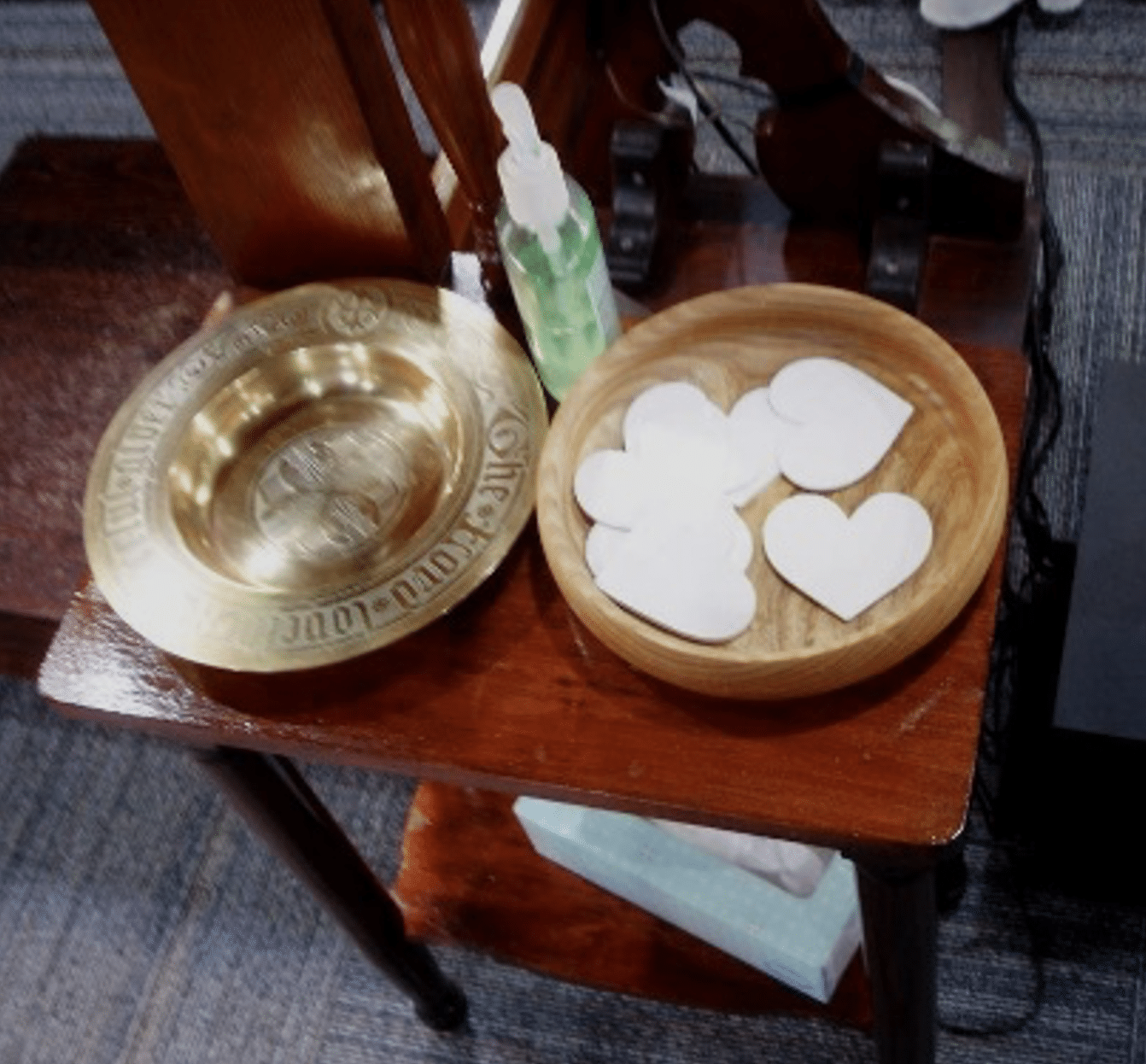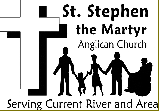Worship at St. Stephen’s
When we go to church, we go to worship. Offering worship is a fundamental mission of a church community.
What do we do during Worship?
The four parts of the Eucharist are the Gathering of the Community, Proclamation of the Word, Liturgy of the Eucharist, and Dismissal of the Community.
Many people attending worship live in Current River and are known to each other. Some come from other places and are new to the church community and may be visitors. In the Gathering of the Community, we come together to be a worshiping community and welcome everyone. In the welcome, people are invited to share what God has done for them. Typically, we hear of how family members have been blessed.
In the Proclamation of the Word, passages from the Bible are read so that we can hear God’s word speaking through the ancient scriptures. The sermon, about 15 minutes, draws out themes from scripture readings and applies them to relevant issues in people’s lives. The church community then prays for the world, Current River and area, the church, and those in need. People are invited to bring their own concerns; see below ‘Prayers: Sunday Worship’. We say a general confession and shake hands as a sign of peace.
In the Liturgy of the Eucharist the gathered community blesses the bread and wine so that spiritually it becomes the body and blood of Jesus, and in the blessing, we remember God’s acts of salvation. We receive the bread and wine. The act of receiving the bread and wine is called communion. A person who is baptized may receive communion; see below ‘Receiving Communion’.
In the Dismissal of the Community, we are dismissed to go and make a difference in the world.
Following worship, join us for coffee hour, and birthday cake on the 2nd Sunday of the month.
A Communion service is what we call the Distribution of Reserved Sacrament by a Deacon at a Public Service. Reserved Sacrament is bread and wine that has been consecrated. The order of service is adapted from a Eucharist, except that the Eucharistic Prayer is omitted. We are following the policy of the Bishop of Algoma, and this service is used when the Pastor is on vacation or absent.
Morning Prayer has the Gathering of the Community, Proclamation of the Word, and Dismissal of the Community and may be lead a Deacon or Parish Lay Reader. Normally Morning Prayer is done on the 4th Sunday of the month.
Prayers: Sunday Worship
A book to write your prayer for thanksgiving and intercession (request) is kept on the lectern in the middle of the nave; the nave being the main part of the building. These requests are prayed for during the Sunday worship and through the week.
Every household on the Parish List is prayed for on a cycle of two households each Sunday.
A parishioner may ask the clergy to pray for them during worship; it may be a prayer for healing or for help coping with a troublesome issue. When a person goes to receive communion, he or she takes a white heart from the table by the lectern and holds it in his or her hand so that the clergy can see it. The clergy will then ask the person what they would like prayer for; then place their hand on the shoulder of the person and pray for the person/circumstance.

Receiving Communion
Baptism is the sacrament of initiation, and a person who is baptized is a full member of the church and entitled to all the rights and privileges of membership. Anyone who is baptized with water in the name of the Father, Son and Holy Spirit may receive communion.
People are welcome to receive both the bread and the wine. Some choose to receive in one kind only. If you do not wish to receive the wine, it is also acceptable to touch the bottom of the chalice. If you do not wish to receive the bread or the wine, cross your arms over your chest. People who do not receive communion may receive a blessing.
A child may receive communion with their parent’s permission. Generally, when a child becomes interested in receiving it, is the time they may start receiving. At this point the child is developing an awareness that this is something special and they want to be part of the experience. The theological understanding may be I want to be part of God’s family.
As the child participates in Sunday School, learns stories from the Bible and listen to the words of the liturgy, the child may develop a deeper understanding of what it means to receive communion.
A preparation program, Life in the Eucharist, is offered for children who can read; contact the Pastor if interested. Parents and children can work on it at home, or it may be offered to a group of children from time to time. This program may be done after a child is receiving communion, and it serves to deepen the experience of the child.
Gluten Free Wafers
Gluten free wafers are available for communion; please advise a sidesperson (usher) before the service begins if you would like one.
Keeping People Healthy
Considering the concern of the spread of flu and COVID, we encourage people to follow these public health practices for our worship:
- Washing hands reduces the spread of disease, and it is helpful if everyone washed their hands before coming to worship, especially Altar Guild members, clergy, servers and Eucharistic Assistants.
- Sanitizer is located beside the lectern for everyone’s use.
- If you don’t want to shake someone’s hand during the peace, wave.
- If you do not wish to receive the wine, cross your arms across your chest. Instead, it is perfectly acceptable to receive the bread only. New report asserts common cup is safe, Dipping can increase bacteria count in cup.
The Bishop is discouraging the practice of intincture. Dipping the bread in the wine actually spreads more germs. If you are not feeling well and are concerned about spreading germs, please do not use Intincture for receiving communion.
Lay Ministry
Our worship involves the whole people of God. Lay people help lead the worship through greeting people as they enter, reading lessons, leading prayers of the people, singing in the choir, serving at the altar, and assisting with the distribution of communion.
We would like to encourage those that play instruments to take part in our service; see Hymns Scored for Guitar in the Common Praise, the New Anglican Hymnal.
Those that are interested in pursuing a course of study can become a Parish Lay Reader; for more information see Parish Lay Reader, Ministry Description.
Music
Our Music Director, plays a digital piano and the Anglican hymn book, Common Praise, is used. The choir leads our singing from September to June. Singing hymns and responses expresses our emotions, and the lyrics proclaim God’s grace. The hymn book has both traditional and contemporary hymns. Supplemental hymns may be printed in the bulletin. We worship together to remind us we are not alone and that we support each other.
We are also interested in involving more musicians in our worship; and those interested should speak with Canon Ed Swayze or the Music Director.
Children
Children are an important element of our worship service. A Sunday School program for children under age 12 is provided to help the children grow in their faith. During July and August quiet activities can be provided while children stay with parents. A change table is in the main floor washroom.
Reverse Offering
Reverse Offering is on 3rd Sunday of the month. Food is collected and donated to the Current River Churches’ Food Cupboard and kept for St. Stephen’s emergency food bag.
What does Worship do for us?
Different people get different things out of worship and different styles of worship appeal to different people.
For some, worship is a means to connect with God. Joy is expressed, sadness as well. The teaching received provides guidance to live one’s life. Prayers are offered for your deep concerns. People you worship with may become friends, good friends. Through the experience of worship, you may receive God’s grace: the strength you need to face the challenges you have; nourishment to sustain you on your journey through life.


